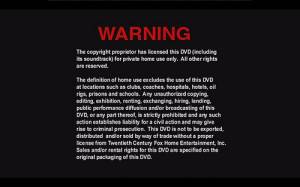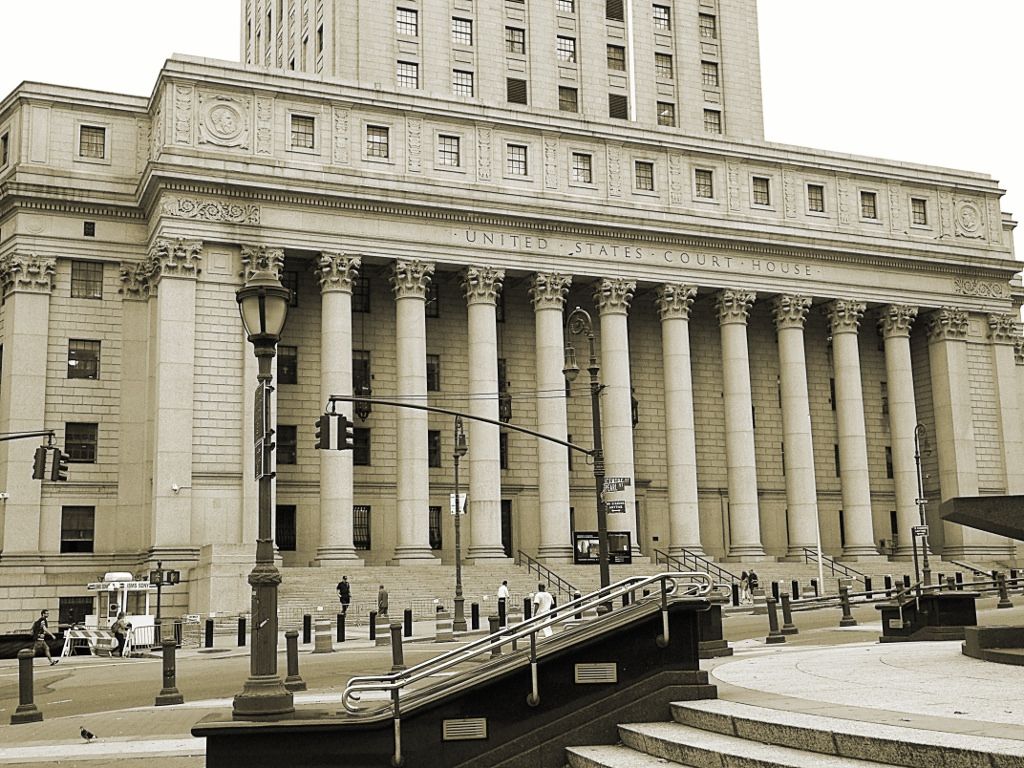Consequences of Pirating Copyrighted Material (17 U.S.C. § 506; 18 U.S.C. § 2319)
Whenever you’ve popped a movie into your DVD player, you probably remember seeing the stern warning and label from the FBI about the consequences of violating Federal Anti-Piracy laws:

“The unauthorized reproduction or distribution of a copyrighted work is illegal. Criminal copyright infringement, including infringement without monetary gain, is investigated by the FBI and is punishable by up to five years in federal prison and a fine of $250,000.”1
Additionally, because movies and music are freely available to download from peer-to-peer file sharing sources, many people assume that it is perfectly legal to stock up on your favorite selections by using these often unreliable programs. Nothing could be further from the truth.
Just because you download a copyrighted work from the internet, doesn’t mean doing so is necessarily legal. Unless you paid for the download from an authorized distributor, chances are you’ve violated federal law.
Can You Copy A CD or DVD You Already Own?
Unless a “fair use” exception applies to a piece of copyrighted material, generally, you must get permission from the copyright holder before you can make or distribute copies of the creator’s work. Fair use can be for reasons such as criticism, comment, news reporting, teaching, scholarship, or research.
Most everyone has made a copy of an audio or data CD they already own. Provided that the copy is for personal, private use or enjoyment only, generally speaking, this isn’t considered piracy, but is an exception under the fair use doctrine.
However, copying movies and software already protected by anti-copying technology can get you into trouble, as the Digital Millennium Copyright Act criminalizes circumvention of controlled access to a protected work.2
The United States government protects all material that has been copyrighted, patented, or trademarked. Infringing on these protections can result in fines and injunctions, criminal prosecution, or both.
What is Criminal Infringement of a Copyright? (17 U.S.C section 506)
Copyrights are governed under Chapter 17 of the United States Code. Copyrighted material are protected pieces of “intellectual property.” This means a creative work or invention that comes from someone’s mind and includes works of art, manuscripts and designs.
According to 17 U.S.C. section 506, whenever a person intentionally infringes a copyright, he or she shall be punished if the infringement was committed:
- For purposes of commercial advantage or private financial gain;
- By the reproduction or distribution, including by electronic means, during any 180–day period, of one or more copies of copyrighted works, which have a total retail value of more than $1,000; or
- By the distribution of a work being prepared for commercial distribution, by making it available on a computer network accessible to members of the public, if such person knew or should have known that the work was intended for commercial distribution. The term “work being prepared for commercial distribution” includes:
- A computer program;
- A musical work;
- A motion picture or other audiovisual work; or
- A sound recording.
To constitute copyright infringement, unauthorized distribution means:
- The copyright owner has a reasonable expectation of commercial distribution; and
- The copies of the work have not been commercially distributed; or
- A motion picture, if, at the time of unauthorized distribution, the motion picture:
- Has been made available for viewing in a motion picture exhibition facility; and
- Has not been made available in copies for sale to the general public in the United States in a format intended to permit viewing outside a motion picture exhibition facility.
Federal Consequences of Pirating Copyrighted Material (18 U.S.C. Section 2319)
The U.S. government criminalizes intentional infringement of copyrighted material under 17 U.S.C section 506. If you are convicted of a misdemeanor violation of copyright infringement, according to 18 U.S.C. section 2319, you face up to one year in prison, a maximum $100,000 fine, or both. A felony violation of federal anti-piracy law is punishable as follows:

For Commercial Advantage or Financial Gain Purposes
- Up to five years in prison; or
- A maximum $250,000 fine; or
- By both imprisonment and fine.
For Reproduction or Distribution Purposes
- Up to three years in prison; or
- A maximum $250,000 fine; or
- By both imprisonment and fine.
If Made Publicly Available on a Computer Network
- Up to three years in prison for reproduction or distribution purposes; or
- Up to five years’ imprisonment for commercial advantage or financial gain; or
- A maximum $250,000 fine; or
- By both imprisonment and fine.
Your punishment is likely to increase, depending on whether:
- The total number of copyright infringements exceeds 10 copies;
- The retail value of the material involved exceeds $2,500;
- The infringement occurred over more than a six-month period; and
- You’ve suffered any prior criminal copyright infringement convictions.
Contact Wallin & Klarich Today if You Are Facing A Violation of Anti-Piracy Law
If you or someone you care about is facing criminal charges for violating federal anti-piracy laws of any federal crime you should contact one of our experienced federal criminal defense attorneys at Wallin & Klarich.
Our attorneys at Wallin & Klarich have been successfully defending our clients in federal courts throughout Southern California for over 40 years. We may be able to negotiate for a voluntary correction of an alleged violation without involving criminal prosecution. If your case is prosecuted, we may be able to have the charges against you reduced or dismissed altogether.
If we determine that a guilty plea is in your best interest, we will help you to avoid the more serious consequences of a conviction such a prison sentence or a substantial fine.
With offices in Los Angeles, Sherman Oaks, Torrance, Tustin, San Diego, Riverside, San Bernardino, Ventura, West Covina and Victorville, Wallin & Klarich has an established reputation of providing our clients with the very best legal representation. We will help you get the best result possible in your case.
Call us today at (877) 4-NO-JAIL or (877) 466-5245 for a free telephone consultation. We will get through this together.
1. [Federal Bureau of Investigation: “Intellectual Property Theft”: http://www.fbi.gov/about-us/investigate/white_collar/ipr/ipr]↩
2. [Digital Millennium Copyright Act: 17 U.S.C. § 1201]↩


